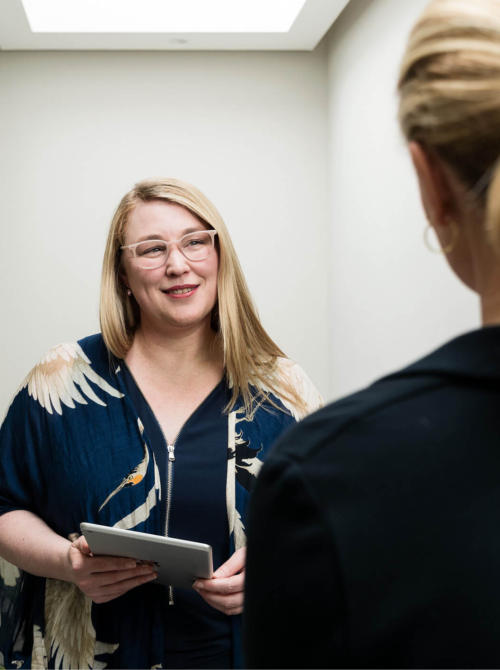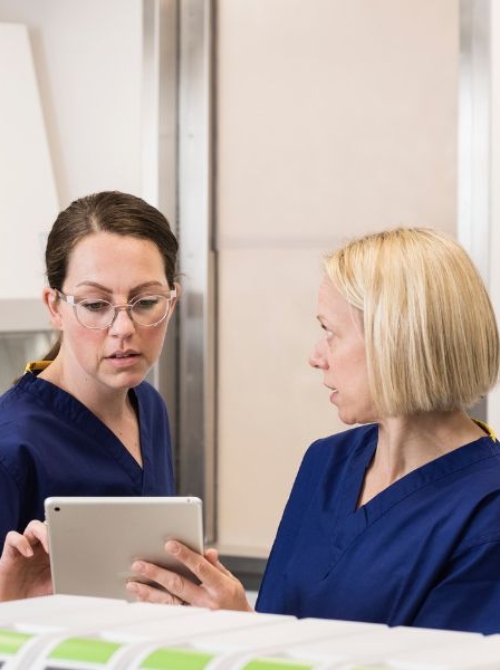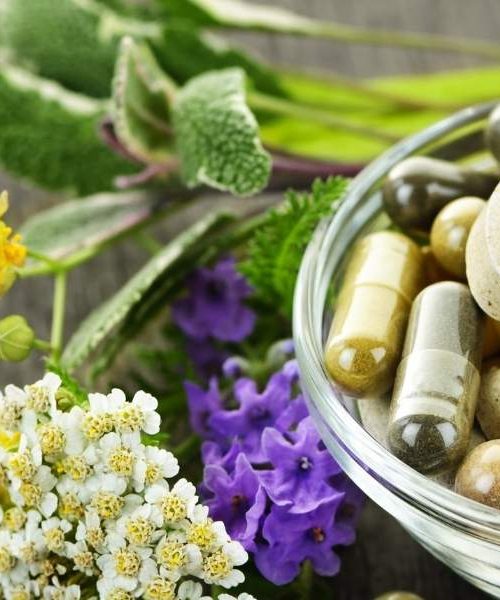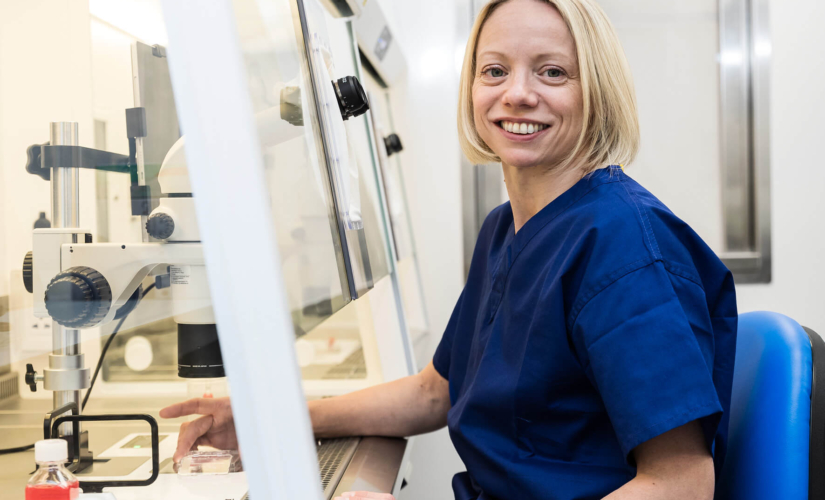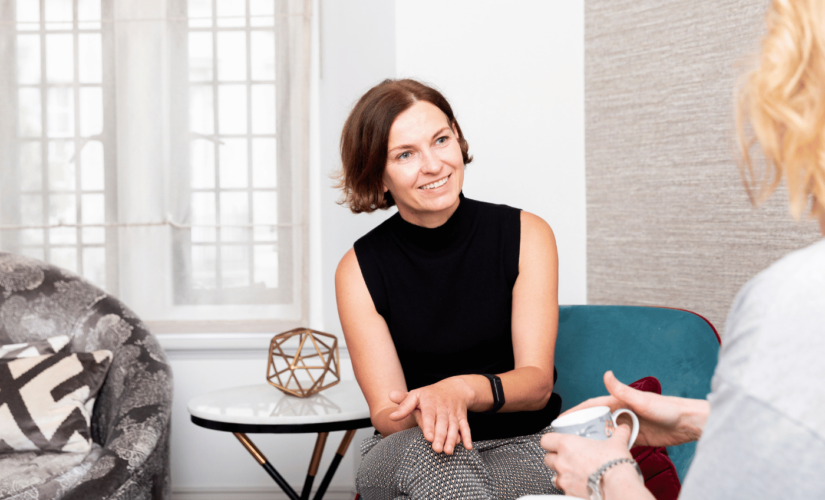Preparing for IVF
IVF may seem like a daunting experience, especially when you may not be sure how to prepare for it. Once you’ve decided to start IVF, it’s important to start preparing your mind and body for it immediately, as it may help with a more successful result.
Trudi Campbell heads up our nursing team, and all this week, she’s sharing tips and advice from the wider nursing team, our consultants, nutritionists and counsellors on how to prepare for IVF, making you treatment-ready.
How to prepare your body for IVF
Diet
To make sure your eggs are in the best possible health, adopting healthy habits is one of the first steps that should be taken when preparing for IVF. So, it goes without saying that diet is an important area to focus on when both TTC and preparing your body for IVF.
Generally, the recommendation is that you eat an ‘Anti-inflammatory diet’ which includes Mexican, Lebanese and Mediterranean-type diets. Lots of green leafy vegetables, grilled protein (minimal red meat), small meals and often, brown rice, legumes and low Glycaemic Index foods.
When preparing for IVF, or TTC, your diet should include:
- Water – is essential but usually forgotten. You should drink at least 1.5l a day of mineral or filtered water.
- Your 5 A Day – blueberries, raspberries, pomegranates and strawberries are great sources of antioxidants, which help to reduce the environmental damage to our cells. Dark, leafy greens like spinach or kale provide essential prenatal nutrients like calcium, iron and folate. Broccoli is another great vegetable to be added to your diet.
- Whole grains, oats, quinoa, lentils, chickpeas.
- Healthy fats – salmon and other fatty fish, nuts, free-range eggs, seeds, and lentils. If you’re eating meat, go for organic poultry for lean protein and essential fatty acids. Live and organic yoghurt is another great choice.
- Caffeine – if you’re a coffee drinker, limit your caffeine intake to one cup a day. Don’t forget caffeine is also found in chocolate, green or black tea and some soft drinks. Also, try to steer clear of decaffeinated coffee or tea as they contain several chemicals used during the decaffeination process.
- Alcohol – even used in moderation, alcohol can lengthen the whole conceiving process, so it should be avoided where possible. Your alcohol intake should be minimal during stimulation and stop before egg collection and for a few days after the procedure.
- Oral probiotics such as kefir, natural yoghurt and kombucha can help with symptoms of bloating and constipation.
Read our full Fertility Diet guide here.
Supplements
If you want to be sure you’re getting all the necessary nutrients and vitamins, you and your partner can also consider taking supplements after discussing it with your doctor.
Our nursing team recommend the below supplements before and during IVF.
- Folic Acid 400mcg daily – this vitamin is not only important for the neural tube development of the baby, but it is also involved in the formation of DNA and the reduction of homocysteine, which is linked to miscarriages.
- Vitamin D 1000 IU daily – essential for the production of sexual hormones.
- CoEnzyme Q 10 600mg daily (200mg three times a day) – a powerful antioxidant.
You may also wish to discuss taking the below with your consultant:
- Vitamin C 1000mg daily – promotes progesterone (a sexual hormone linked to pregnancy) and improves sperm. Vitamin C is also known for its antioxidant properties.
- Melatonin 3mg once at night – to improve the quality of sleep.
- Omega 3 DHA daily – improves blood flow, regulates sexual hormones, and boosts your baby’s brain.
- Zinc citrate 30mg daily – improves sperm. Zinc deficiency has been linked to miscarriages.
- Selenium 100-150 mcg daily – improves sperm. Selenium deficiency has been linked to miscarriages.
- Probiotics daily – increases IVF success from implantation to live birth.
Your consultant may have recommended other supplements in addition to or in place of what we have listed above based on your clinical circumstances. These will be outlined in your initial consultation letter. Please continue to take these as advised.
We advise you to avoid any Chinese medicines and Vitamin A, including retinol products.
If you wish to seek advice from a nutritionist, we are happy to support this. They are experts in their field and as long as they are aware of your fertility journey and what supplements you are already taking, you can follow their recommendations without checking with us.
What medications may interfere with IVF drugs?
You should always discuss any medication or supplements you are thinking of taking with your doctor. Even if they are natural supplements, you should still address them with your doctor, as it may not be safe for you to be taking them during this time. Generally, anything that’s safe to take during pregnancy will be safe to take during IVF if your doctor approves.
Exercise
Another great way to improve your physical health is by exercising. Exercise also has a positive impact on our mental health – it reduces stress and anxiety, and it positively influences our mood.
During the IVF cycle, the ovaries will become larger and there is a risk of ovarian torsion, which is why we recommend your exercise regime should be mainly low impact, gentle exercise during your stimulation.
Light yoga, pilates (not reformer) and walking are always recommended. If you’re attending a class, we recommend that you inform your instructor about where you are in the treatment cycle so they can modify moves/exercises if necessary, as some postures can twist the abdomen area.
Towards the end of the IVF cycle, we wouldn’t recommend high-intensity exercise and high cardiovascular activity before the egg collection.
If you’ve been working out regularly before starting to prepare for IVF, proceed with the intensity and frequency of exercising that is comfortable for you and discuss it with your doctor.
Read more about exercising during IVF.
How does sleep affect IVF?
A good night’s sleep plays a big role in our health. Sleep deprivation results in hormonal imbalances and it can trigger weight gain and fatigue, making it harder to deal with stress both physically and mentally.
Also, the poor quality of women’s sleep can negatively affect IVF results, so it’s very important to look into your sleep quality when preparing for IVF.
Try to come up with the bedtime routine that works best for you.
Discover relaxing activities that help you unwind and prepare your mind and body for sleep – it could be reading, meditation, a light body stretch or simply a relaxing shower.
Melatonin, a hormone responsible for sleep and egg quality, gets produced only when it gets dark, and artificial lighting can confuse the body and not make it want to sleep.
Make sure to dim the lights in the evening and avoid using electronic devices right before bedtime. Did you know, you can set app limits on your phone, switch off apps at certain times, and also add a ‘night shift’ tint your screen, limiting the impact of blue light?
Chemicals to avoid when preparing for IVF
Understandably, the fewer environmental toxins we have in our body before, during and especially after the IVF embryo transfer (the procedure when the fertilised egg is placed inside the womb), the better. This doesn’t necessarily mean you must give up on the beauty procedures you usually get. For example, when going to the hairdresser or getting your nails done, always choose a well-ventilated salon and products with fewer chemicals. The same applies to manicures and pedicures, although dark nail polish (and pretty much all of them) should be removed before egg collection as it can interfere with checking the oxygen levels on your finger by the pulse oximeter machine.
If you are a smoker, you should consider quitting, as smokers have a lower chance of IVF success.
Sex during IVF
It is safe to have sex during the first stage of ovarian stimulation, however, it is best to avoid it towards the end of the cycle as there is a risk of follicular rupture and ovarian torsion. Due to enlarged ovaries, sex can be uncomfortable or even painful. In case of premature ovulation of several eggs, there is a risk of multiple pregnancies if you are having unprotected sex.
Your partner must abstain from sex for 2-5 days before their sperm sample collection to increase the chances of pregnancy.
Travel
The chaos, uncertainty and volatile nature of travel we all experienced during Covid are hopefully behind us now, but even still, if you’re TTC, you need to consider the Zika virus.
Travelling to a region with Zika virus is still a very important consideration when either TTC or preparing for IVF or a FET. It’s a disease transmitted by the bite of an infected mosquito in tropical and subtropical regions. These mosquitoes usually bite during the day, peaking early morning and late afternoon/evening.
A baby with Zika virus infection can be born with microcephaly (a condition where a baby’s head is much smaller than expected). In pregnancy, the Zika virus can also result in complications such as miscarriage and premature labour.
Zika virus is transmitted from mother to fetus during pregnancy. Most people infected don’t present symptoms, and the incubation period can be 3-14 days.
Which destinations are affected? Countries that have reported Zika Virus transmission (past or current) are found in the USA, South America, West and Central Africa (including Ethiopia and Uganda), India and Southeast Asia.
The recommendation is that the woman or couple try not to get pregnant or have IVF or FET for two months (for females) and three months (for males).
If you have visited a country deemed at risk for Zika, you’re advised that you can’t have treatment with:
- Eggs/embryos – you can’t donate or use your eggs to create or store embryos or use those embryos for treatment for two months. The restriction time commences from the date you re-entered the UK.
- Sperm – you can’t donate or use your sperm to create or store embryos for three months. The restriction time commences from the date you re-entered the UK.
Please note that the list of countries above is regularly updated. Our team will do our best to update information regularly. Still, it is recommended that all patients look at the website to obtain the most current information about risk areas and degree of risk.
Preparing your mind for IVF
We all know that stress is not helpful in any situation, however, it’s not always easy to stop worrying, especially during an intense period of life. Cortisol, a hormone that gets triggered by stress, can cause hormonal imbalances in both men and women, and therefore, it is possible for stress to affect fertility. Read more about stress and fertility here.
With that in mind, ensuring you take the right care of yourself when preparing for IVF is even more important. Great ways to manage stress are:
- Taking your supplements – consult with your doctor about the right supplements for you.
- Meditation helps you connect with yourself, improve your focus, and relieve stress. Just 10-15 minutes a day of calm breathing exercises can tremendously improve your well-being.
- Acupuncture – This alternative medicine has been found to reduce the impact of stress hormones on the body, helping keep a healthy balance of fertility hormones.
- Journaling – writing down your thoughts is a great way to relieve emotional build-up. Journaling has a positive therapeutic effect as it helps to organise your thoughts and better understand your feelings.
- Prioritising yourself – don’t put your life on hold, book the holidays you were dreaming of, start that new job, or buy the dress you wanted. If you get pregnant, these things will become less important and easy to fix. Don’t forget to care for yourself and do what makes you happy.
- Research – if you feel that reading about fertility and the IVF process makes you feel more confident about the procedure, feel free to research it as frequently as you like. Just try not to get too overwhelmed by the information – allow yourself up to 45 minutes of daily reading and set a timer to ensure you’re not exceeding the time limit.
What support will I need?
IVF can be a stressful experience for both you and your partner, so it is important to take care of your relationship and each other. Take the time to talk about your feelings, making sure you’ve both clearly understood each other’s expectations and how you would like to be supported during the process without blaming each other. Include your partner in the IVF process – discuss and make all decisions together.
Fertility treatment has a big physical impact on women – your partner can help you by taking on tasks such as making sure you have enough medication and injections, educating them about fertility, how to prepare your body for IVF treatment and how to support you emotionally.
Ask your doctor or nurse about our fertility counselling service if you need to speak to a professional.
How to prepare for IVF mentally
We hope the past week has helped give you focus and feel more in control when you do come to start your IVF treatment.
You can do as much as you can to prepare yourself physically, but here are some tips when it comes to preparing yourself mentally.
Be optimistic about your chances, but be realistic. Try to enter the clinic with a positive mindset and discuss anything that makes you anxious with your doctor or nurse. Here at The Evewell, we will always help you relieve these negative feelings.
Plan a pleasant activity before or after your appointments, such as a walk in a park with your partner or having a smoothie or lunch together. If your schedule allows, book a massage or an acupuncture session.
Ask your doctor as many questions as you have about your treatment. Share any side effects or new symptoms you’ve been experiencing, even if they look insignificant.
At The Evewell, we deeply care about all of our patients and their loved ones. If you have any concerns or worries, please contact us; we can help. Whether that’s a consultation with one of our doctors to guide you through the IVF process or putting you in touch with Fertility counsellors and nutritionists. Get in touch by either emailing us at appointments@evewell.com or giving us a call on 020 3974 0950.
